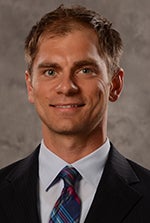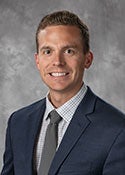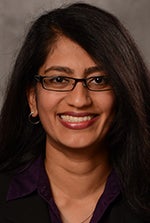Rotations, Experiences, and Preceptors

Rotations:
| Orientation | Rotations | Research |
|---|---|---|
| July | August-June | December |
|
Required (7 months total)
Electives (can choose up to 3, 1 month each)
|
|
Rotation Descriptions:
SICU
The surgical critical care rotation is a required acute care learning experience. The Surgical Intensive Care Unit is a 20 bed ICU comprised of patients from the Trauma Critical Care Service (TCCS) and Cardiothoracic Surgery service (CTS). Patient care responsibilities will lie primarily with the TCCS team where the resident will be exposed to critically ill patients from trauma surgery, neurocritical care, neurointerventional, vascular surgery, colorectal surgery, general surgery, otolaryngology, obstetrics, and orthopedic surgery. Patient care coverage is also required with the CTS team where ~800 open heart surgery patients as well as patients with mechanical circulatory support (IABP, Protek Duo, Impella, durable VAD, and ECMO) are admitted per year. Daily rounding responsibilities are based upon patient load and acuity between the two services.
A majority of rotation time will be spent doing direct patient care with time allocated for topic discussions, didactic presentations, and protocol development based on the needs and interests of the resident. Opportunities will exist to coordinate this rotation so that the resident may assist in precepting a pharmacy rotation student, physician assistant student, or PGY-1 pharmacy resident.
MICU
The Medical ICU rotation is an acute care inpatient experience designed to develop a resident's skills in participation in a multidisciplinary critical care environment. The resident will be exposed to a variety of disease states and supportive care issues commonly encountered in critical care (sepsis, shock, respiratory failure, acute intoxication/withdrawal, DKA/HHS, ARDS, stroke, status epilepticus, etc.) The rotation is designed to be fast-paced and challenging. Residents will learn with a mixture of self-directed exploration, active participation in the critical care environment, patient-based discussions, and scheduled topic discussions. The resident will refine advanced pharmacotherapeutic skills in the identification and resolution of drug therapy problems in the critically ill medicine population. Beyond the expansion of a knowledge base in critical care medicine, emphasis for the rotation will be placed on the further development of critical thinking skills, time management abilities, and communication skills that will be essential to patient care practice in any setting. Residents will be afforded a high level of autonomy and therefore an active presence in the MICU is encouraged at all times. The MICU is a 20-bed unit, that can flex up to 30 beds if need be. The service is divided into two rounding teams each led by a pulmonary intensivist. One team is staffed by medicine residents (MICU-A) while the other is staffed by advanced practice providers (MICU-B). The resident will initially be responsible for MICU-A; however, depending on acuity, skillset, and rotation timing, may cover MICU-B as well. Opportunities will arise to precept P4 students and PGY1 residents, depending on timing of rotation.
CICU
The cardiac intensive care unit rotation is a required acute care learning experience for the THSJAA PGY2 residency program. The CICU has the ability to flex bed number from 6 to 8 beds as needed. The CICU service carries between 6 to 14 patients at a time from hospital admission to discharge. The team comprises of the attending cardiologist, two or three medical residents, (+/- medical students and pharmacy students), a bedside nurse, the nurse rounder, respiratory therapist and the clinical pharmacy specialist. Commonly seen disease states in the unit are acute myocardial infarctions, decompensated heart failure, cardiogenic vs septic shock, ventricular and atrial arrhythmias, post cardiac arrest patients, and post cardiac procedural patients (i.e., percutaneous coronary intervention, TAVRs, MitraClips, carotid stents, watchman devices). Teaching rounds begin between 8:30 or 9:00am and often last two to three hours depending on patient acuity and the number of patients on service. On this rotation you will learn how to manage patients with mechanical circulatory support (i.e., IABP, Protek Duo, Impella CP or RP) or other cardiac devices (i.e., transcutaneous temporary pacemakers, pericardial catheters, and/or swan-ganz catheters).
The PGY2 resident should be prepared to make interventions on CICU rounds daily and take over the clinical functions of the clinical pharmacy specialist within the first two weeks of rotation. The resident will spend a majority of time on rotation doing direct patient care. Sometime will be allocated for topic discussions, and development of a final didactic presentation for the CICU team. On occasion, opportunities may exist to precept a pharmacy student or PGY1 resident during rotation.
ED
The Emergency Department at Trinity Health - Trinity Health Ann Arbor is a verified American College of Surgeons Level 1 Adult Trauma Center and Comprehensive Stroke Center, serving a wide range of high-acuity conditions in the adult, pediatric and geriatric population. There are 65 beds in the ED, with another 10 beds in the Emergency Observation Center for which the ED pharmacist is responsible for. Additionally, patients who are boarding fall under the ED pharmacist's care. There is a great diversity of patient conditions the resident must be competent in assessing and managing.
The PGY2 Emergency Medicine rotational experience consists of two separate four to five week rotations that will be tailored upon the previous experiences of the PGY2 critical care resident. The Emergency Medicine 1 Rotation will focus on ED orientation, operations, drug administration, and emergency medicine topics suited to the residents need, with Emergency Medicine 2 focusing on more advanced topics mentioned below. Each rotation will consist of the resident providing emergency clinical pharmacy services under the preceptorship of the clinical pharmacy specialist, while working alongside attending emergency medicine physicians, midlevel providers, and Michigan Medicine Emergency Medicine Residents serving their community hospital rotation at Trinity Health – St. Joseph Mercy Ann Arbor
It is expected that the resident will partake in critical patient emergencies with the multidisciplinary team to optimize safe and effective pharmacotherapy for patients, which includes bedside drug information recommendations and monitoring, appropriate drug selection and dosing, drug administration/alternate routes of drug administration recommendations, patient and clinician education, provision of care in "Code" situations, and identification and resolution of problems with medication regimens. The ultimate rotational goal is to provide a pharmacy practice environment where the resident will apply the clinical, bedside, communication and teaching skills developed to interact within the emergency medicine team, while demonstrating the competency skills necessary to serve independently as the primary EM pharmacist at the end of the rotation. Additionally, longitudinal experiences that will further the emergency medicine skills of the PGY2 resident include occasionally staffing the Emergency Department independently during the weekend staffing requirement shifts, and partaking in the hospital-wide code blue response team.
Throughout the rotation, the resident will be expected to become proficient in the treatment of the following disease states and emergencies, including but not limited to: BLS/ACLS, rapid sequence intubation, hypertensive urgency vs emergencies, acute coronary syndromes, OB emergencies, antimicrobial stewardship in the ED (CAP/HAP, UTI, STI’s, Sepsis), anticoagulation reversal, trauma management and emergencies, airway emergencies, ischemic/hemorrhagic strokes, acute alcohol withdrawal, acute psychosis and agitation, toxicologic emergencies, hyper-/hypoglycemia/DKA, and drug administration.
Additional required activities to enhance knowledge on the aforementioned emergent disease states include daily patient case presentations, weekly topic discussions, nursing and physician educational in-services, assistance with guideline/policy review and development for emergency medicine-related topics, presentations for the Emergency Department Provider and Quality and Operations committee/Code Blue Committee/Michigan Medicine Weekly Residency conference, and projects suited to the learning needs of the resident and the department.
Neuro ICU
The Neuroscience Intensive Care Unit takes care of ischemic strokes, hemorrhagic strokes, aneurysmal subarachnoid hemorrhages, status epilepticus, and other neurologic emergencies. The neurocritical care team also serves as a consult service to assist with the care of patients with neurological conditions located in other ICUs within the hospital. Pharmacy residents will round daily on an interdisciplinary team composed of an attending neuro intensivist, mid-level practitioners, nursing, respiratory therapy, and pharmacist. The resident will also be expected to attend stroke alerts within the hospital during rotation hours.
A majority of rotation time will be spent doing direct patient care. Topic discussions take place a few times per week with an emphasis placed on primary literature. Projects may include literature reviews, education for providers or nurses, policy development, and MUEs based on the interests of the resident. Opportunities to assist in precepting a pharmacy student on rotation may be available as well.
Longitudinal Experiences:
Research project, Continuing Education (CE)
Code blue coverage and precepting
Documentation including clinical interventions and medication safety reporting
Service Commitment: Every 3rd weekend predominately performing clinical and emergency department coverage, and one holiday shift
Critical Care Journal Club / Evidence-Based Practice PGY1 educational series
Leadership Development through the Society of Critical Care Medicine (SCCM) Annual Congress
Teaching involvement at the University of Michigan College of Pharmacy
Committee participation
Precepting involvement
Local/National Presentations
- The PGY2 resident will participate in the following:
- ASHP Midyear
- Trinity Health Research Forum
- Society of Critical Care Medicine Annual Meeting
- Michigan Society of Health-System Pharmacists Residency Conference
- Michigan Pharmacists Association Annual Meeting
- Trinity Health Ann Arbor Annual Resident Research Forum

Dave Sudekum, PharmD, BCPS
Medical ICU

Jason Hecht, PharmD, BCPS, BCCCP, FCCM
PGY2 Residency Director
Surgical ICU

Beena Cheriyan, PharmD, BCPS
Coronary ICU/Cardiology

Megan Singlar, PharmD, BCCCP
Neuro ICU




